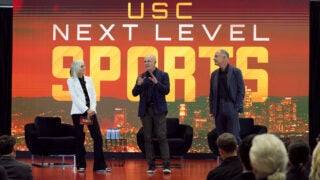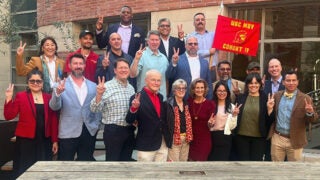Warrior-Scholar Project prepares veterans for rigors of life at a top university
USC, with its long history of supporting veterans, is one of just 12 campuses across the country that participate and the only school in California.
[new_royalslider id=”132″]
The seasoned presidential-campaign strategist asked the group for their opinions on two-year mandatory national service for U.S. citizens.
Some of the students were for it, thinking it could stir up patriotism and a compassion for fellow Americans. Others said it could push people into service who aren’t as passionate as volunteers.
Dan Schnur, the director of USC’s Jesse M. Unruh Institute of Politics who worked on the campaigns of Ronald Reagan and John McCain, wasn’t asking just any group of students. He was asking veterans, there as part of the Warrior-Scholar Project.
The 15 men and women, ages 22 to 39, were at USC last week for a weeklong boot camp intended to introduce them to four-year universities.
“As much as these young men and women would benefit from attending USC, I think the rest of the USC community would benefit from having them here,” Schnur said. “I couldn’t hope to provide the same kind of perspective on the issue that they did.”
Full days
For more than 10 hours a day, students attended lectures and workshops, many by faculty volunteers. At night, they returned to apartments nearby to do homework.
Although many are enrolled in community college, their week was filled with many firsts – debating the rationale of Thomas Paine, discussing the works of Alexis de Tocqueville or doing a university-level writing prompt.
Today was my first official college lecture. I was so excited.
Balam Corzantes
“Today was my first official college lecture. I was so excited,” Balam Corzantes, 37, said as the weeklong program got underway. He works in special operations for the Marines and transitions from Camp Pendleton in a few weeks.
“I just liked the feeling of having an educational conversation that leads to a different point of view,” he said.
Developed by veterans at Yale University in 2012, the program intends to show veterans that a top-tier, four-year university is within reach and gives them a crash course in the academic acumen needed to get there.
Nationally, only 1 percent of veterans attend top 20 universities, according to the project. The project wants to change that, seeing 17 percent of its roughly 300 participants attend top-tier schools.
USC is one of 12 campuses across the country that participate and the only school in California.
USC is the ideal place for this.
Mark Todd
“When I talk about the Warrior-Scholar Project, I say that USC is the ideal place for this,” said Mark Todd, USC vice provost for academic operations. “A lot of them are first generation, are Pell Grant eligible, most of them are community college transfers and a lot of them are underrepresented minorities. We do those four demographics really, really well.”
Last fall, USC counted about 100 undergraduates and roughly 450 graduate students who are veterans. Ben Shaver, who assists running the campus programs for the project, said USC’s numbers stand out, sometimes 10 times higher than what he sees on East Coast campuses.
Military tradition
The school has a long tradition of supporting the military, being a training post during both world wars and continuing its 76-year-old ROTC program when others across the country shuttered. The university has an endowment targeted at funding veterans studying engineering or business, and the USC Marshall School of Business developed the Master of Business for Veterans in 2012 tailored to translate military skill sets into the business world.
It’s also a Yellow Ribbon Program school, where the U.S. Department of Veterans Affairs will match USC’s contribution. USC recently removed its spending cap and provides 50 percent of what is needed for post-9/11 veterans to graduate, which is matched by the VA, Todd said.
“I think it’s so cool these folks have been fighting for liberty and democracy and here they are in with our faculty who teach this stuff,” Todd said. “These people are talking about something these veterans have sacrificed a lot for.”
Todd said he told the group that if they can succeed in the program, “you can succeed at any university.”
In just a few days, Corzantes, who works in infantry tactics, said his writing level “skyrocketed” from the writing classes and workshops, which he was in for about four hours a day.
Enjoying a lunch break in a campus dining hall, he and Army veteran Aaron Bowers — a San Diego resident who oversaw three sniper teams while at Fort Bragg in North Carolina — said that, more than anything, the program gave them the knowledge and the confidence to transition to academia.
And maybe transition to being a Trojan.
“They are at the top of my list now,” Corzantes said. “They’ve held their arms open to us … I’ve never been on a campus that embraces veterans as much as USC.”
“It’s one of my top choices, if not my top choice,” Bowers said.



